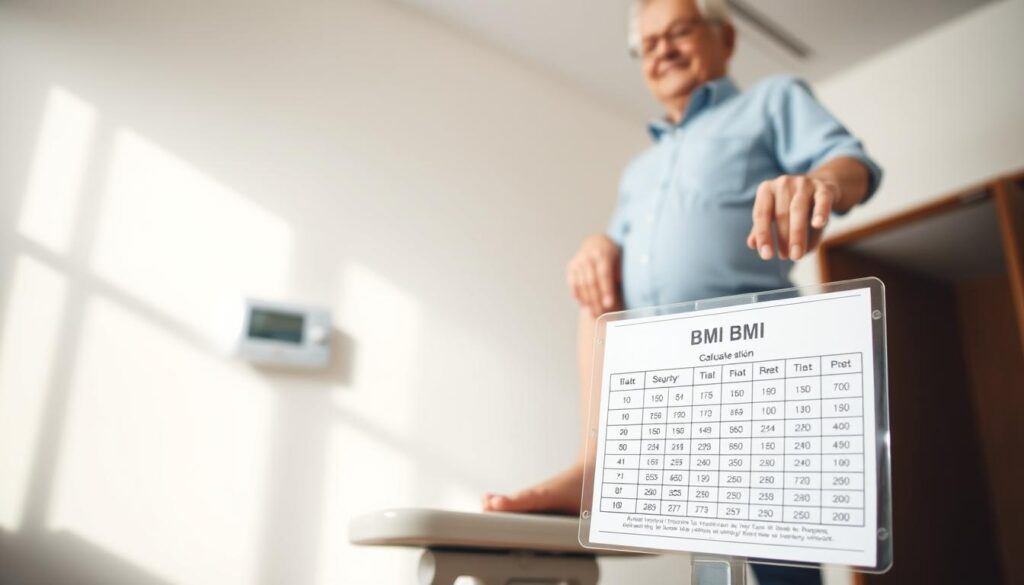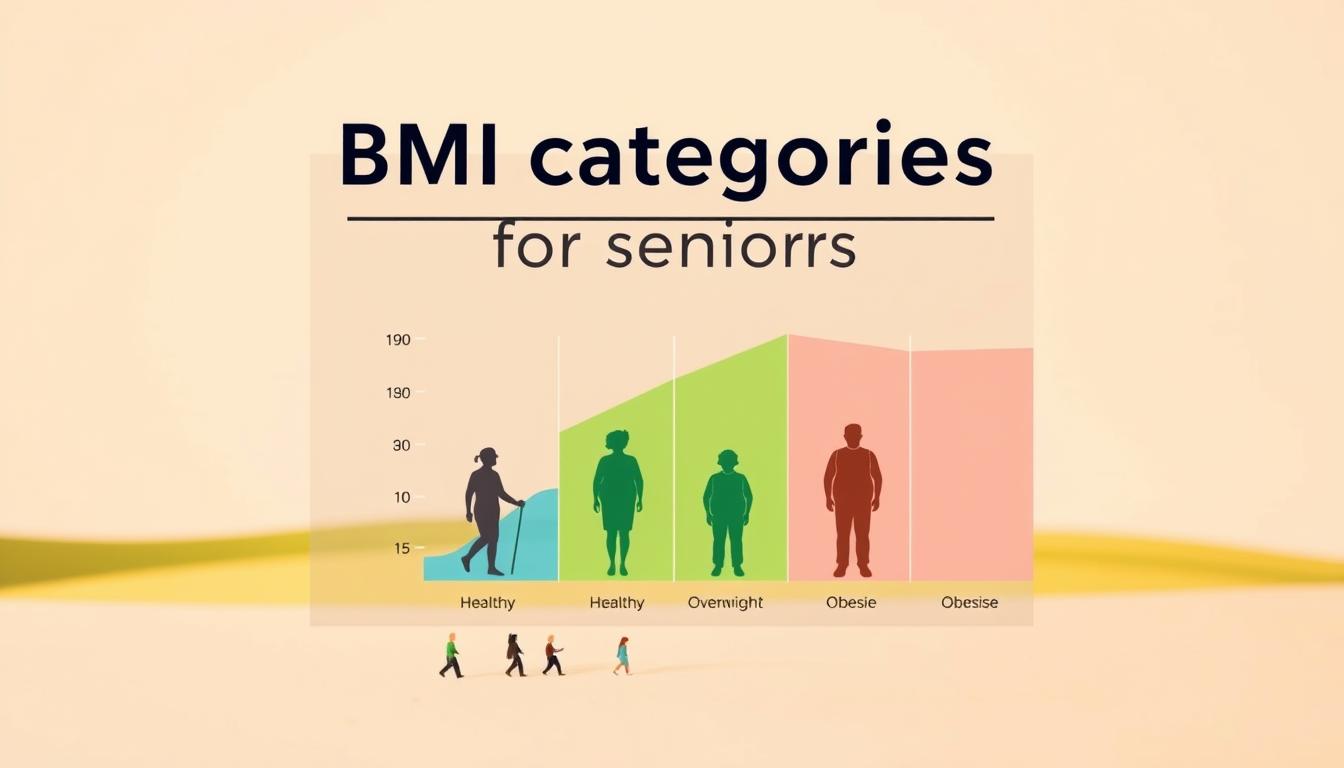As we get older, keeping a healthy weight is key for our health. But have you thought about what’s a good weight for older folks?
Research shows a certain BMI range might help with bone health in older adults. The National Institutes of Health say a BMI of 25 to 27 could help prevent osteoporosis in those over 65.
Knowing about body mass index is important for healthy aging. We’ll look into how BMI is figured out and its impact on older adults.
Key Takeaways
- Maintaining a healthy weight is crucial for overall well-being as we age.
- A BMI of 25 to 27 may offer bone health benefits for adults over 65.
- Understanding body mass index is vital for healthy aging.
- Older adults can benefit from knowing their BMI category.
- A healthy BMI range can help protect against osteoporosis.
Understanding BMI and Its Importance for Seniors
For older adults, knowing their BMI is key. It affects their health and quality of life. BMI, or Body Mass Index, is a simple way to check if your weight is healthy.
What is BMI?
BMI is a measure of weight to height. It’s found by dividing weight in kilograms by height in meters squared (kg/m^2). For seniors, a BMI of 23 to 29.9 is considered healthy.
A healthy BMI range for seniors is slightly different from that of younger adults. This is because aging changes body composition.
Why BMI Matters for Older Adults
BMI is important for older adults because it links to health risks. A healthy BMI can lower the risk of diseases like diabetes and heart disease.
Maintaining a healthy weight is crucial for overall health and well-being. It improves mobility and reduces fall risks, enhancing quality of life.
How BMI Affects Health Outcomes
The BMI of older adults greatly impacts their health. Being underweight or overweight can cause health problems. For example, being underweight might mean malnutrition, while being overweight raises disease risks.

| BMI Category | BMI Range | Health Implications |
|---|---|---|
| Underweight | Less than 23 | Malnutrition, osteoporosis, decreased immunity |
| Healthy Weight | 23-29.9 | Lower risk of chronic diseases, better overall health |
| Overweight/Obese | 30 or greater | Increased risk of diabetes, heart disease, certain cancers |
Calculating BMI: Steps for Seniors
Seniors can find out their BMI easily by following a few steps. This can tell a lot about their health. We’ll show you how to do it, including the formula and other ways to understand it better.
The Formula for BMI Calculation
The BMI formula is simple: BMI = weight in kilograms / (height in meters)2. For example, if a senior weighs 70 kg and is 1.75 meters tall, their BMI is 70 / (1.75)2 = 22.86.
Many online senior BMI calculators make it even easier. They just need your height and weight. This way, seniors can find out their BMI without doing math.
Other Methods to Assess Body Composition
BMI is helpful, but it’s not everything. Other ways to check health include waist measurements and body fat percentage. These give a clearer picture of your body.
Waist circumference is key because it shows visceral fat. This fat is linked to health risks. Checking body fat percentage also shows how much fat you have compared to muscle.
Here’s a look at different ways to check body composition:
| Method | Description | Usefulness for Seniors |
|---|---|---|
| BMI | Weight-to-height ratio | Easy to calculate, general health indicator |
| Waist Circumference | Measures visceral fat | Indicates risk of chronic diseases |
| Body Fat Percentage | Proportion of body fat | Provides detailed body composition insights |
Knowing and figuring out BMI is key for seniors to check their health. By using the formula or online tools and looking at other ways to check body composition, seniors can learn a lot about their health.

BMI Categories and Their Implications
For seniors, knowing about BMI categories is key. They show different health risks and outcomes. As we get older, our body changes, and BMI helps check if our weight is healthy for our height.
Underweight: Risks and Considerations
Being underweight can be risky for seniors. It may lead to a higher chance of death, disability, and dementia.
Studies link being underweight to more health problems in older adults. It’s important to eat enough to keep muscle and bone strong.
Healthy Weight: Maintaining Balance
Keeping a healthy weight is key for seniors’ health and happiness.
A healthy BMI lowers the risk of diseases like diabetes and heart disease. Seniors need to eat right and stay active to keep a healthy weight.
“Maintaining a healthy weight is a key factor in healthy aging.”
Overweight and Obesity in Seniors
Being overweight or obese also poses big health risks for seniors. It increases the chance of chronic diseases.
But, some studies say being a bit overweight might protect against some health issues in older age. This is called the “obesity paradox.”
| BMI Category | Health Risks |
|---|---|
| Underweight (<18.5) | Malnutrition, osteoporosis, decreased immunity |
| Healthy Weight (18.5-24.9) | Lower risk of chronic diseases |
| Overweight (25-29.9) | Increased risk of diabetes, heart disease |
| Obese (≥30) | Higher risk of chronic diseases, mobility issues |
It’s important for seniors to know about BMI categories and their health implications. By keeping a healthy weight, seniors can lower their risk of chronic diseases and live better.
Limitations of BMI for Seniors
Using BMI for seniors has its downsides, mainly because of changes in body composition with age. As we get older, our bodies change, including how fat and muscle are distributed. This can make BMI less reliable as a health measure.
Age-Related Changes in Body Composition
One big change with age is losing muscle mass, known as sarcopenia. This can make someone’s weight or BMI go down, even if their body fat percentage stays the same or goes up. So, seniors might look like they have a normal or even low BMI but still have a lot of body fat. This is a health risk.

Other Factors to Consider: Fat Distribution and Muscle Mass
Other important factors for seniors include fat distribution and muscle mass. Visceral fat, which builds up around organs, is very dangerous. It’s not shown well in BMI calculations. Also, having more muscle mass is linked to better health.
So, while BMI can give a basic idea of health, it’s not enough for seniors. Doctors often look at waist size and muscle mass too. This gives a fuller picture of a senior’s health.
Healthy Weight Management: Tips for Seniors
As we get older, keeping a healthy weight is key for our health. Seniors can really benefit from tips on managing their weight.
Nutrition Strategies for Seniors
Seniors should eat nutrient-dense foods for important vitamins, minerals, and fiber. A diet full of fruits, veggies, whole grains, lean proteins, and healthy fats is best. It’s also good to cut down on processed and high-calorie foods.
For more tips on eating well, check out Maintaining a Healthy Weight from the National Institute on Aging.
Eating right is crucial for a healthy weight. Seniors should eat a variety of foods to get all nutrients. Foods like fruits and veggies are high in fiber, helping you feel full and eat less.
Importance of Physical Activity
Regular exercise is also key for seniors to manage their weight. It helps burn calories, keep muscles strong, and bones healthy. Walking, swimming, and yoga are great because they’re easy on the body and fit different fitness levels.
Staying active improves heart health, lowers disease risk, and boosts mood. Seniors should aim for 150 minutes of moderate exercise or 75 minutes of vigorous exercise weekly. Plus, do muscle-strengthening activities two or more times a week.
Resources and Tools for Monitoring BMI
It’s important for seniors to keep an eye on their BMI. This helps them stay healthy and feel good. There are many tools and resources to help track BMI and make smart health choices.
Online BMI Calculators
Online BMI calculators are simple and handy for seniors. They ask for height and weight to figure out your BMI. Many health websites offer these calculators for free. They help you see how your BMI changes over time.
Consulting Healthcare Professionals
Online tools are great, but talking to doctors is even better. They give advice tailored to your health needs. They can help with diet, exercise, and setting health goals. Using BMI calculators and getting doctor advice helps you stay healthy.


